| Srl | Item |
| 1 |
ID:
065811
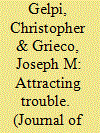

|
|
|
| 2 |
ID:
155780
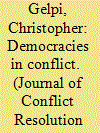

|
|
|
|
|
| Summary/Abstract |
The vast literature on the impact of democratic political institutions on foreign policy behavior has yielded some of the most important developments in our understanding of violence and war over the past thirty years. The Journal of Conflict Resolution has played a prominent role in this growth and development. Critics of the democratic peace have dismissed this literature as a correlation in search of an explanation. However, I argue that the democratic peace literature and its various descendants represent a surprisingly productive example of an empirically focused and puzzle-oriented research program that has produced cumulative scientific knowledge regarding our understanding of international politics. This sustained investigation of democracy and foreign policy has yielded an increasingly robust and sophisticated model of democratic constraint that is the consequence of a progressive research program that compares favorably to earlier research programs that emphasized clashing paradigms of international politics.
|
|
|
|
|
|
|
|
|
|
|
|
|
|
|
|
| 3 |
ID:
093685
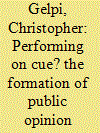

|
|
|
|
|
| Publication |
2010.
|
| Summary/Abstract |
The public's inability to gain direct personal experience or information about American military operations means that individuals must rely on cues to form opinions about war. But in an environment filled will potential cues, which ones do Americans tend to rely on when deciding whether to support an ongoing military operation? This experimental study uses two distinct cues within the context of a newspaper story about the Iraq War to test four theoretical models of the American public's reliance on cues. The results provide fairly consistent support for the "surprising events" model of opinion formation, which suggests that individuals will attend to news events that conflict with their expectations in an effort to update their attitudes toward the war. These results also provide support for the cost/benefit perspective on the formation of public opinion toward war that underpins much of the literature on casualty tolerance during military conflicts.
|
|
|
|
|
|
|
|
|
|
|
|
|
|
|
|
| 4 |
ID:
183692
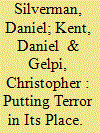

|
|
|
|
|
| Summary/Abstract |
An American’s yearly chance of being killed by a terrorist attack sits at roughly 1 in 3.5 million. Yet, over 40 percent of Americans consistently believe that they or their family members are likely to be a terror victim. Can these inflated estimates of the risks of terrorism be brought closer to reality? With trillions of dollars spent on the “War on Terror,” this question is not just theoretically but practically important. In order to investigate, we use an experimental approach assessing whether people update their beliefs about terrorism when given factual information about the relative risks it presents. We find that public fear of terrorism and demand for countering it can be sharply reduced with better information, dropping essentially to pre-9/11 levels after the treatment and staying that way two weeks later. These results suggest that countering the indirect costs of terrorism may largely require providing more context and perspective.
|
|
|
|
|
|
|
|
|
|
|
|
|
|
|
|
| 5 |
ID:
068262
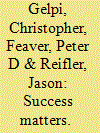

|
|
|
| 6 |
ID:
155192
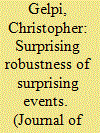

|
|
|
|
|
| Summary/Abstract |
Paolino presents two core critiques of “Performing on Cue.” First, he suggests that my dichotomous measures of support for the Iraq War bias against finding evidence of reinforcing cues. Second, he suggests that using party identification (ID) as a moderator for the treatment effects biases against finding an impact for elite cues. Unfortunately, Paolino’s statistical modeling choices do not reflect these theoretical concerns. His arguments about attitude strength and source credibility imply that the experimental treatments should have nonlinear effects. Yet Paolino relies on an ordinal logit model with a linear interaction of the treatments with a six-point index of party ID and Bush approval. A more appropriate approach for capturing Paolino’s critiques would estimate a multinomial logit model with categorical interaction effects between the treatments and the source credibility. These more appropriate statistical modeling choices reveal that the findings of “Performing on Cue” are very robust to the concerns raised by Paolino.
|
|
|
|
|
|
|
|
|
|
|
|
|
|
|
|
| 7 |
ID:
156542
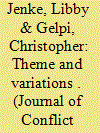

|
|
|
|
|
| Summary/Abstract |
Since its establishment in 1963, the Correlates of War (COW) project has sought to build cumulative knowledge about international conflict through the application of the scientific method to the study of militarized interstate behavior. Early analyses from the COW project found substantial variation in the causal model of war across the nineteenth and twentieth centuries, but COW scholars later sought to develop a general model of war that avoided post hoc historical periodization. We use out of sample cross validation to evaluate the plausibility of assuming temporal homogeneity for statistical models of international conflict that span the nineteenth and twentieth centuries. Our results suggest that the causal model of war changes substantially across historical eras. In particular, great care should be taken in generalizing Cold War findings to other historical eras. Our findings demonstrate the importance of exploring temporal variation in the causal model of war.
|
|
|
|
|
|
|
|
|
|
|
|
|
|
|
|